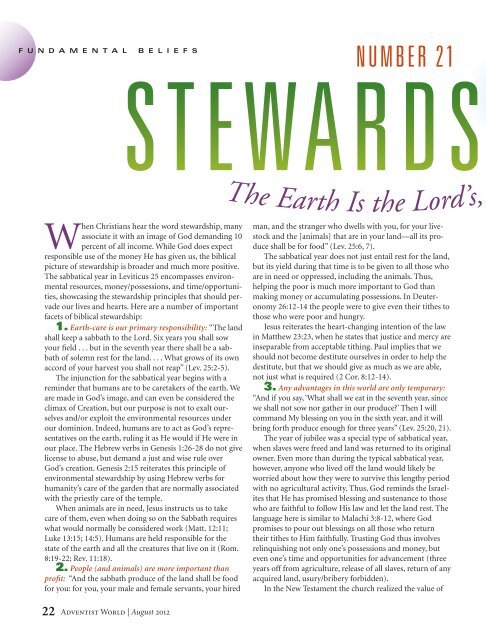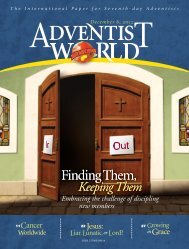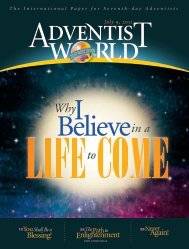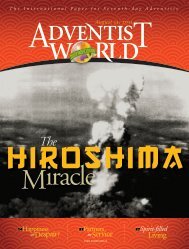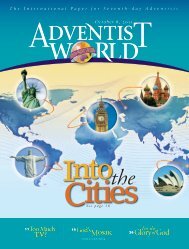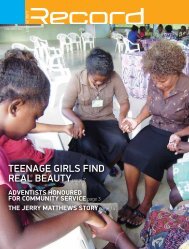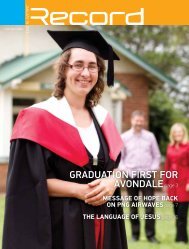Download ADVENTIST WORLD as a PDF - RECORD.net.au
Download ADVENTIST WORLD as a PDF - RECORD.net.au
Download ADVENTIST WORLD as a PDF - RECORD.net.au
Create successful ePaper yourself
Turn your PDF publications into a flip-book with our unique Google optimized e-Paper software.
NUMBER 21<br />
F U N D A M E N T A L B E L I E F S<br />
STEWARDS<br />
The Earth Is the Lord’s,<br />
When Christians hear the word stewardship, many<br />
<strong>as</strong>sociate it with an image of God demanding 10<br />
percent of all income. While God does expect<br />
responsible use of the money He h<strong>as</strong> given us, the biblical<br />
picture of stewardship is broader and much more positive.<br />
The sabbatical year in Leviticus 25 encomp<strong>as</strong>ses environmental<br />
resources, money/possessions, and time/opportunities,<br />
showc<strong>as</strong>ing the stewardship principles that should pervade<br />
our lives and hearts. Here are a number of important<br />
facets of biblical stewardship:<br />
1. Earth-care is our primary responsibility: “The land<br />
shall keep a sabbath to the Lord. Six years you shall sow<br />
your field . . . but in the seventh year there shall be a sabbath<br />
of solemn rest for the land. . . . What grows of its own<br />
accord of your harvest you shall not reap” (Lev. 25:2-5).<br />
The injunction for the sabbatical year begins with a<br />
reminder that humans are to be caretakers of the earth. We<br />
are made in God’s image, and can even be considered the<br />
climax of Creation, but our purpose is not to exalt ourselves<br />
and/or exploit the environmental resources under<br />
our dominion. Indeed, humans are to act <strong>as</strong> God’s representatives<br />
on the earth, ruling it <strong>as</strong> He would if He were in<br />
our place. The Hebrew verbs in Genesis 1:26-28 do not give<br />
license to abuse, but demand a just and wise rule over<br />
God’s creation. Genesis 2:15 reiterates this principle of<br />
environmental stewardship by using Hebrew verbs for<br />
humanity’s care of the garden that are normally <strong>as</strong>sociated<br />
with the priestly care of the temple.<br />
When animals are in need, Jesus instructs us to take<br />
care of them, even when doing so on the Sabbath requires<br />
what would normally be considered work (Matt. 12:11;<br />
Luke 13:15; 14:5). Humans are held responsible for the<br />
state of the earth and all the creatures that live on it (Rom.<br />
8:19-22; Rev. 11:18).<br />
2. People (and animals) are more important than<br />
profit: “And the sabbath produce of the land shall be food<br />
for you: for you, your male and female servants, your hired<br />
man, and the stranger who dwells with you, for your livestock<br />
and the [animals] that are in your land—all its produce<br />
shall be for food” (Lev. 25:6, 7).<br />
The sabbatical year does not just entail rest for the land,<br />
but its yield during that time is to be given to all those who<br />
are in need or oppressed, including the animals. Thus,<br />
helping the poor is much more important to God than<br />
making money or accumulating possessions. In Deuteronomy<br />
26:12-14 the people were to give even their tithes to<br />
those who were poor and hungry.<br />
Jesus reiterates the heart-changing intention of the law<br />
in Matthew 23:23, when he states that justice and mercy are<br />
inseparable from acceptable tithing. P<strong>au</strong>l implies that we<br />
should not become destitute ourselves in order to help the<br />
destitute, but that we should give <strong>as</strong> much <strong>as</strong> we are able,<br />
not just what is required (2 Cor. 8:12-14).<br />
3. Any advantages in this world are only temporary:<br />
“And if you say, ‘What shall we eat in the seventh year, since<br />
we shall not sow nor gather in our produce?’ Then I will<br />
command My blessing on you in the sixth year, and it will<br />
bring forth produce enough for three years” (Lev. 25:20, 21).<br />
The year of jubilee w<strong>as</strong> a special type of sabbatical year,<br />
when slaves were freed and land w<strong>as</strong> returned to its original<br />
owner. Even more than during the typical sabbatical year,<br />
however, anyone who lived off the land would likely be<br />
worried about how they were to survive this lengthy period<br />
with no agricultural activity. Thus, God reminds the Israelites<br />
that He h<strong>as</strong> promised blessing and sustenance to those<br />
who are faithful to follow His law and let the land rest. The<br />
language here is similar to Malachi 3:8-12, where God<br />
promises to pour out blessings on all those who return<br />
their tithes to Him faithfully. Trusting God thus involves<br />
relinquishing not only one’s possessions and money, but<br />
even one’s time and opportunities for advancement (three<br />
years off from agriculture, rele<strong>as</strong>e of all slaves, return of any<br />
acquired land, usury/bribery forbidden).<br />
In the New Testament the church realized the value of<br />
22 Adventist World | August 2012


